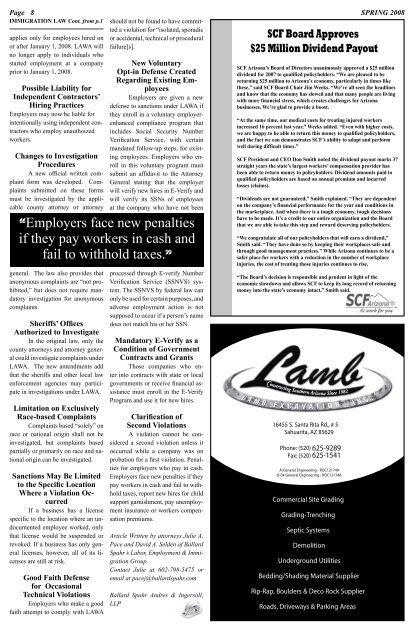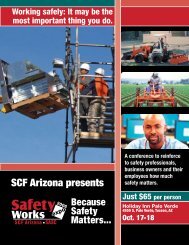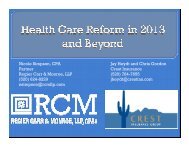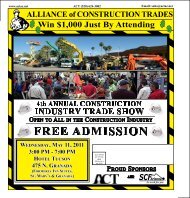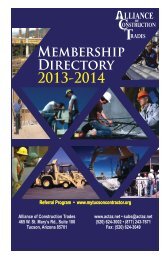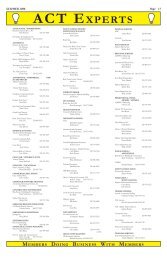Arizona INSIDE
1-13 - Alliance of Construction Trades
1-13 - Alliance of Construction Trades
- No tags were found...
You also want an ePaper? Increase the reach of your titles
YUMPU automatically turns print PDFs into web optimized ePapers that Google loves.
Page 8<br />
IMMIGRATION LAW Cont. from p.1<br />
applies only for employees hired on<br />
or after January 1, 2008. LAWA will<br />
no longer apply to individuals who<br />
started employment at a company<br />
prior to January 1, 2008.<br />
Possible Liability for<br />
Independent Contractors’<br />
Hiring Practices<br />
Employers may now be liable for<br />
intentionally using independent contractors<br />
who employ unauthoized<br />
workers.<br />
Changes to Investigation<br />
Procedures<br />
A new official written complaint<br />
form was developed. Complaints<br />
submitted on these forms<br />
must be investigated by the applicable<br />
county attorney or attorney<br />
general. The law also provides that<br />
anonymous complaints are “not prohibited,”<br />
but does not require mandatory<br />
investigation for anonymous<br />
complaints.<br />
Sheriffs’ Offices<br />
Authorized to Investigate<br />
In the original law, only the<br />
county attorneys and attorney general<br />
could investigate complaints under<br />
LAWA. The new amendments add<br />
that the sheriffs and other local law<br />
enforcement agencies may participate<br />
in investigations under LAWA.<br />
Limitation on Exclusively<br />
Race-based Complaints<br />
Complaints based “solely” on<br />
race or national origin shall not be<br />
investigated, but complaints based<br />
partially or primarily on race and national<br />
origin can be investigated.<br />
Sanctions May Be Limited<br />
to the Specific Location<br />
Where a Violation Occurred<br />
If a business has a license<br />
specific to the location where an undocumented<br />
employee worked, only<br />
that license would be suspended or<br />
revoked. If a business has only general<br />
licenses, however, all of its licenses<br />
are still at risk.<br />
Good Faith Defense<br />
for Occasional<br />
Technical Violations<br />
Employers who make a good<br />
faith attempt to comply with LAWA<br />
should not be found to have committed<br />
a violation for “isolated, sporadic<br />
or accidental, technical or procedural<br />
failure[s].<br />
New Voluntary<br />
Opt-in Defense Created<br />
Regarding Existing Employees<br />
Employers are given a new<br />
defense to sanctions under LAWA if<br />
they enroll in a voluntary employerenhanced<br />
compliance program that<br />
includes Social Security Number<br />
Verification Service, with certain<br />
mandated follow-up steps, for existing<br />
employees. Employers who enroll<br />
in this voluntary program must<br />
submit an affidavit to the Attorney<br />
General stating that the employer<br />
will verify new hires in E-Verify and<br />
will verify its SSNs of employees<br />
at the company who have not been<br />
Employers face new penalties<br />
if they pay workers in cash and<br />
fail to withhold taxes.<br />
processed through E-verify Number<br />
Verification Service (SSNVS) system.<br />
The SSNVS by federal law can<br />
only be used for certain purposes, and<br />
adverse employment action is not<br />
supposed to occur if a person’s name<br />
does not match his or her SSN.<br />
Mandatory E-Verify as a<br />
Condition of Government<br />
Contracts and Grants<br />
Those companies who enter<br />
into contracts with state or local<br />
governments or receive financial assistance<br />
must enroll in the E-Verify<br />
Program and use it for new hires.<br />
Clarification of<br />
Second Violations<br />
A violation cannot be considered<br />
a second violation unless it<br />
occurred while a company was on<br />
probation for a first violation. Penalties<br />
for employers who pay in cash.<br />
Employers face new penalties if they<br />
pay workers in cash and fail to withhold<br />
taxes, report new hires for child<br />
support garnishment, pay unemployment<br />
insurance or workers compensation<br />
premiums.<br />
Article Written by attorneys Julie A.<br />
Pace and David A. Selden of Ballard<br />
Spahr’s Labor, Employment & Immigration<br />
Group.<br />
Contact Julie at 602-798-5475 or<br />
email at pacej@ballardspahr.com<br />
Ballard Spahr Andres & Ingersoll,<br />
LLP<br />
SCF Board Approves<br />
$25 Million Dividend Payout<br />
16455 S. Santa Rita Rd., # 5<br />
Sahuarita, AZ 85629<br />
Phone: (520) 625-9289<br />
Fax: (520) 625-1541<br />
A-General Engineering - ROC121749<br />
B-04 General Engineering - ROC121748<br />
Commercial Site Grading<br />
Grading-Trenching<br />
Septic Systems<br />
Demolition<br />
Underground Utilities<br />
Bedding/Shading Material Supplier<br />
Rip-Rap, Boulders & Deco Rock Supplier<br />
Roads, Driveways & Parking Areas<br />
SPRING 2008<br />
SCF <strong>Arizona</strong>’s Board of Directors unanimously approved a $25 million<br />
dividend for 2007 to qualified policyholders. “We are pleased to be<br />
returning $25 million to <strong>Arizona</strong>’s economy, particularly in times like<br />
these,” said SCF Board Chair Jim Weeks. “We’ve all seen the headlines<br />
and know that the economy has slowed and that many people are living<br />
with more financial stress, which creates challenges for <strong>Arizona</strong><br />
businesses. We’re glad to provide a boost.<br />
“At the same time, our medical costs for treating injured workers<br />
increased 16 percent last year,” Weeks added. “Even with higher costs,<br />
we are happy to be able to return this money to qualified policyholders,<br />
and the fact we can demonstrates SCF’s ability to adapt and perform<br />
well during difficult times.”<br />
SCF President and CEO Don Smith noted the dividend payout marks 37<br />
straight years the state’s largest workers’ compensation provider has<br />
been able to return money to policyholders. Dividend amounts paid to<br />
qualified policyholders are based on annual premium and incurred<br />
losses (claims).<br />
“Dividends are not guaranteed,” Smith explained. “They are dependent<br />
on the company’s financial performance for the year and conditions in<br />
the marketplace. And when there is a tough economy, tough decisions<br />
have to be made. It’s a credit to our entire organization and the Board<br />
that we are able to take this step and reward deserving policyholders.<br />
“We congratulate all of our policyholders that will earn a dividend,”<br />
Smith said. “They have done so by keeping their workplaces safe and<br />
through good management practices.” While <strong>Arizona</strong> continues to be a<br />
safer place for workers with a reduction in the number of workplace<br />
injuries, the cost of treating those injuries continues to rise.<br />
“The Board’s decision is responsible and prudent in light of the<br />
economic slowdown and allows SCF to keep its long record of returning<br />
money into the state’s economy intact,” Smith said.


